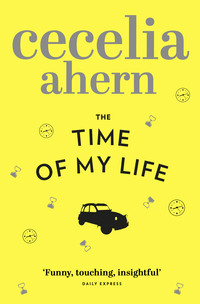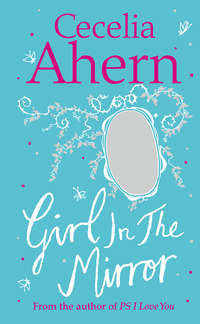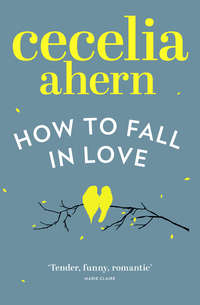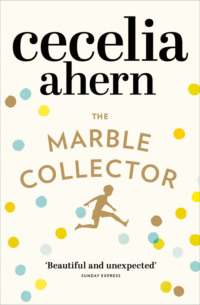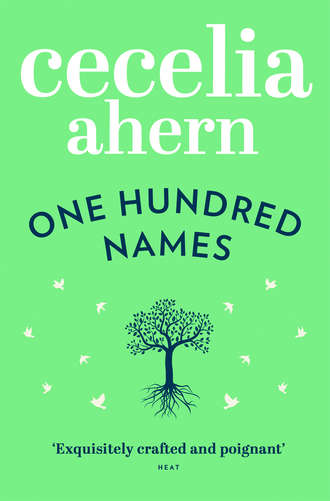
Полная версия
One Hundred Names
Once they’d entered their solicitor’s nearby offices and had escaped the reporters, Kitty dropped her bag to the floor, leaned her forehead against the cold wall and took deep breaths.
‘Jesus,’ she gasped, feeling her entire body flush with heat.
‘Are you okay?’ Donal asked gently.
‘No,’ she whispered. ‘I’m so sorry, I’m so, so sorry about this.’
She felt a light pat on her back and was grateful for his support. She had caused this and he was perfectly entitled to have a go at her.
‘This is absolutely ridiculous,’ Paul raged to the solicitor in the next room, pacing before his desk. ‘Four hundred thousand euro, plus his legal fees. This is nothing like you said it would be.’
‘I said it might—’
‘Don’t you dare backtrack now,’ he yelled. ‘This is appalling. How could they do this to us? We’ve already apologised. Publicly. At the start of our show on February the eighth. Four hundred and fifty thousand people saw that we apologised, that we acknowledged he was not guilty, millions more saw it on the internet and God knows how many more after today. You know, I bet we were set up from the start. Those two women, I bet they and Colin Maguire are in on it together, and they’re getting a cut of that money. I wouldn’t be surprised. Nothing would surprise me now. Jesus. Four hundred thousand. How am I supposed to explain this to the Director-General?’
Kitty removed her forehead from where it was resting against the cool wall of the corridor and stood at the door of the solicitor’s office. ‘We deserved it, Paul.’
There was a silence and she heard Donal’s intake of breath behind her. Paul spun round and stared at her as if she was nothing, which was a certain amount more than she felt right then.
‘We ruined Colin Maguire’s life. We deserved to hear every single word they said in there. We shouldn’t have made such an enormous mistake and now we have to take responsibility for our actions.’
‘Our actions? No. Your actions. You ruined his life, I was just the idiot who assumed you had done your job properly and had actually done your research. I knew we never should have given you this story. Mark my words, the network will never hire you again, do you hear me, Kitty? You don’t know the first thing about covering a bloody story,’ he yelled.
Kitty nodded and backed away. ‘’Bye, Donal,’ she said quietly.
He nodded, and she left the building through the back exit.
She was afraid to return to her flat for two reasons. She wasn’t sure if the court’s decision would fuel the attacks on her home or if they would die down now that Colin had been further vindicated and financially awarded. The other reason was that she was afraid to be alone. She didn’t know what to do; she couldn’t spend another moment thinking about this, beating herself up about it, but she didn’t feel it was right not to either. She deserved to be punished, she needed to wait out this feeling of absolute shame. She retrieved her bicycle from the backstreets of the Four Courts and headed in the direction of Constance’s home. Paul may have accused her of not having the first clue how to cover a story but she knew someone who did know, and perhaps it was time to start learning again.
Constance and Bob’s home was a basement apartment in a three-storey Edwardian house in Ballsbridge, the rest of which housed the magazine. The basement flat had over the years become an extended office, which they shared and lived in together and had done so for twenty-five years. The kitchen, never used as they ate out almost every night, was hidden beneath the clutter of memorabilia and items they had collected on their extensive travels. Every surface was littered with an eclectic mix of art: ebony carvings next to happy Buddhas and Venetian glass naked ladies, African and Venetian masks placed on old teddy bears’ heads, and on the wall Chinese etchings and landscape paintings hung beside Bob’s favourite satirical comic strips. The entire place felt like them. It had personality, it was fun, it was alive. Teresa, the housekeeper, had worked for Constance and Bob for twenty-five years and was now into her seventies. She didn’t appear to do anything more than light dusting and watch The Jeremy Kyle Show, but Constance, who wasn’t one for caring about a tidy home anyway, couldn’t find it in her heart to let her go. Teresa was more than familiar with Kitty and so immediately welcomed her into the flat without question and returned to her armchair with a cup of tea to watch a man and a woman screaming at each other over a lie detector test that hadn’t gone in anybody’s favour. Kitty was thankful Teresa never watched the news and was completely unaware of the week’s drama, sparing her an inquisition. She went into Constance and Bob’s office.
Their desks were directly opposite one another and equally piled high with what appeared to be rubbish, but which was probably vital paperwork. Above Constance’s desk were nude photographs of women in 1930s France, draped in provocative poses. She had put them there for Bob’s viewing pleasure and in return he had placed African art of naked men above his desk for her. The floors were as cluttered as the surfaces, with rug after Persian rug of busy patterns overlapping one another, so that it was difficult not to trip on the lumps and bumps. As well as the continuation of art from the rest of the flat, there were dozens of porcelain cats in various positions on the floor all along the room. Kitty knew that Constance hated them, real ones and the porcelain kind, but they had been her mother’s and when she passed away Constance had insisted on giving them a home. The room was so busy Kitty wondered how on earth they could concentrate at all, but they could and they were mighty successful at it. Constance had moved from Paris to Dublin to annoy her wealthy father and study English Literature in Trinity College. There she edited the college paper and her first job was writing for the Society section of the Irish Times, where she met Robert McDonald. Bob was ten years older than she, and was the Times’s business affairs correspondent. When she eventually tired of being told what to do, which never took long, Constance decided to frustrate her father furthermore by leaving her respectable job with Ireland’s major broadsheet and instead start her own publication. Bob came along with her, and after cutting their teeth on various magazines, they set up Etcetera twelve years ago, their most successful venture yet. It wasn’t the highest selling magazine in Ireland, as it failed to divulge tips on how to remove cellulite or how to get the perfect bikini body, but it was widely respected in the industry. To write for Etcetera was considered an honour, a great step on the ladder to success. Constance was a straight-talking no-nonsense editor with an impeccable eye for a story and for talent; Etcetera was where many of the country’s successful writers had started out.
Kitty went to the filing cabinet and was immediately impressed by the neat system that Constance had developed. It was nothing like the rest of her home: every single article that had been written for Etcetera or any other magazine Constance had run, articles she had written for other publications and all ideas she’d had in the past and for the future were neatly filed on cards in alphabetical order. Kitty was unable to ignore her inherent nosiness and so read as many as she could before getting to N. And there it was, a simple brown manila envelope filed under ‘Names’. It was sealed, and though she knew she shouldn’t break the deal she had made with Constance, she couldn’t contain her impatience and so sat down at Constance’s desk to open it. Teresa appeared at the door and Kitty jumped like a naughty schoolgirl caught smoking. She dropped the envelope on the desk and then laughed at herself.
‘Have you seen her yet?’ Teresa asked.
‘Yes, last week. I couldn’t see her this week because I had this thing to attend,’ she said, feeling guilty that the court case had once again kept her from seeing Constance. She knew she should have made the effort but the daily grind at the Four Courts left her feeling drained, self-pitiful, introspective and, quite frankly, rather defensive and snappy. She didn’t think it was fair to bring that energy to Constance’s bedside.
‘I imagine she looks desperate. My Frank died from cancer. He had it in his lungs. He smoked forty a day but still, no one deserves what he went through. He was the same age as Constance. Fifty-four,’ Teresa tutted. ‘Would you believe I’ve spent almost as many years without him as I had with him?’ She shook her head again. ‘Do you want a cup of tea? It tastes a bit metallic. I found coins in the teapot. They used it as their piggy bank. Bob told me to take them to the bank. Seventy-six euro and twenty-five cent they had in there.’
Kitty laughed at their eccentricity and declined the offer of the metallic tea. Excited finally to have the envelope with Constance’s idea in her possession, and overcoming the urge to open the envelope, Kitty called Bob straight away to arrange a visit. Three of her calls rang out to his voicemail, and then when she was tired of waiting and was en route to the hospital on her bicycle, she felt her phone vibrate. She spoke into her headset.
‘Hi, Bob. I’m just making my way over, hope that’s okay. I have the idea Constance was going to tell us about. I can’t wait any longer.’
‘It’s not a good time,’ Bob replied, his stress evident even above the sound of the traffic around Kitty. ‘She’s, er, she’s had a bad turn.’
Kitty stopped cycling suddenly and a fellow cyclist almost ran into the back of her and swore her out of it. She lifted her bike out of the cycle lane and onto the pavement.
‘What happened?’
‘I didn’t want to say anything to you – you’ve had a rough enough week as it is and I was hoping she would improve – but she’s … she’s gone downhill since you saw her. She was drifting in and out of consciousness, she couldn’t recognise me for the past two days, she was confused, hallucinating, speaking mostly in French. Today she’s, well, she’s in a coma, Kitty …’ His voice cracked.
‘Do you want me to be there with you?’ Kitty asked, feeling panic inside and genuinely with all of her heart wanting to be there, in that place, with that smell, with him, by Constance’s side.
‘No, no, you’re busy, I’m okay.’
‘I’m not, Bob. I’ve nothing to … I’ve got nothing, okay? I want to be there. Let me, please?’
Kitty hung up and cycled as though her life depended on it, which in a way, it did.
‘Hi, Steve, it’s me. I was just thinking of you and, well, I had a few things to say about what we last talked about. So here goes. “Rad or Bad”. “Rad” is short for “radical”, but cool kids shorten it for even cooler effect. It’s a bit surfer dude language, though, so it’s probably a bit dated. Then there’s “Cool or Fool”, or to make it a bit more modern you could say “Cool or Tool”. And finally my favourite, and probably yours too as it brings in a football angle – “Score or Whore”. Hope your boss likes them and I hope it’s not too late. Okay, well, you’re obviously not in, or you are and you’re listening to this thinking I’m drunk or … I don’t know what you’re thinking. I’ll go now. Oh, and one last thing. Constance passed away. Tonight. And, em, God, I’m so sorry to be crying on your answering machine but … I don’t quite know what to do. Okay. Thanks for listening. ’Bye.’
Chapter Four
Though Kitty hadn’t spent much time with Constance over the past few months, she had instinctively known she was there. There was a difference when somebody died. Their absence was felt, at every second of every day. Kitty would think of a question and would suddenly go to call Constance for the answer. She would think of an amusing story she would want to share with her or, more frustratingly, she would remember a half-finished conversation she would want to complete or a question that had somehow gone unanswered. Because Constance wasn’t there Kitty wanted her more than ever, and she tortured herself over her lack of visits to the hospital and for not calling her more regularly, not just when Constance was sick but throughout her life. There were events Kitty could have invited her to, nights out they could have shared together; there was so much time wasted not spending it together. But in the end, she knew that if they were to relive their friendship all over again, they would do it exactly the same way. Constance hadn’t needed Kitty in her life any more frequently than Kitty had been there.
Not having work to engross herself in, or a boyfriend to help distract her and show her the joys and beauty of her own life, or a functional family that lived in the same county or possessed the abilities to be understanding and show compassion, Kitty felt more alone than ever. The only place she felt she wanted to be was at the offices of Etcetera. Being there was like being with Constance, who had been the beating heart of that magazine. It was founded by her, made up of her ideologies, inspired by her, and by simply holding an issue of the magazine in her hands, Kitty felt that in some way Constance still lived on. Kitty supposed it was like seeing the child of someone who had passed away; their looks, their mannerisms, their little quirks were passed down.
As soon as she entered the office Kitty felt the pang of loss she had been running from. It hit her like an icy breeze, like a slap in her face that took her breath away. Her eyes immediately filled up.
‘Oh, I know,’ Rebecca, the art director, said, catching sight of Kitty frozen at the door. ‘You’re not the only one who’s done that.’ She went to her and hugged her warmly, took her coat off and helped her move from the spot. ‘Come on in, they’re all in Pete’s office, brainstorming.’
Pete’s office. Calling it that immediately riled Kitty, and though it had absolutely nothing to do with Pete, she momentarily despised him, as if he alone had conspired with God to obliterate her friend. As duty editor he had taken over while Constance was ill, and Cheryl Dunne, an ambitious young woman not much older than Kitty, was acting deputy editor, while Bob spent the past months full time with Constance. Because of Pete and Cheryl’s presence, the place felt different. Pete and Cheryl had found their own routine and natural rhythm, and while it seemed everybody else had learned to fall into step with that rhythm, Kitty had been struggling.
It was nine months since Constance had been at the helm of Etcetera, six months since she had stepped inside the offices at all, and in that time it was clear to see that the stories Kitty had written were not exactly her best. They were by no means below par or else Pete wouldn’t have published them and Constance, who had been keeping a close eye on everything even until the end, would have dragged Kitty into the hospital kicking and screaming to put her in her place. She had been good at doing that. As well as wanting her magazine to be the greatest on the shelves, she never wanted anybody to fail to meet their potential. To her that was the greatest error of all.
Knowing that, after Constance’s funeral Kitty had retreated to her flat, not to lick her wounds but to further pour salt on them by poring over her stories, trying to figure out where she had gone wrong, where she needed to go in the future, what her strengths and weaknesses were. As soon as she read her stories from the past six months she could see that they lacked sparkle. As much as she hated to admit it, and she never would to anybody out loud, there was almost a robotic painting-by-numbers feel to her writing. They were informative, emotional and possessed style and a little flair, and they met the standards of the magazine on all levels by covering similar themes with different angles – with a monthly magazine, having a unique angle to an already covered story was top priority – but, rereading them, Kitty felt a stale taste in her mouth. After the disastrous experience with Thirty Minutes she was aware that nothing she had ever written and would probably ever write again would please her as it once had. She knew she was deliberately finding flaw with everything about herself, and finding very little to celebrate. She second-guessed everything she said and did but, despite her self-doubt, she knew she was right about the deterioration of her writing.
Constance’s method of motivation during brainstorming was not for everyone. It had been perfect for Kitty, but while she knew Pete and Cheryl appreciated Constance’s methods, she also knew they couldn’t wait to leave the office so they could return to their own sources of inspiration: other magazines, newspapers, internet sites and twenty-four-hour news networks to see what was new, current and hot. Constance’s method was always about looking within for the answers. She had asked her staff to look at themselves for stories: what was moving them at that particular moment, what was challenging them, what were the issues not of the day in the world but of the day in their hearts and minds; mumbo jumbo to people like Pete and Cheryl. Constance always believed those subjects would make stronger stories. Instead of writing for the market, she wanted them to write for themselves. It was only then, she believed, that the readers would connect. She wanted her writers not just to be informative and stylish but she encouraged the artist within them to come out. How stories were decided on varied between Constance telling specific people to write particular stories that she knew they were suited to, or which would challenge them, and also by listening to ideas. She was very much an advocate of hearing people’s ideas.
And that’s what the problem was – Kitty had finally nailed it. In the six months of Etcetera stories that Kitty had pored over, she now realised she hadn’t written a single article that had been an idea of her own. Each story had been proposed by Pete or Cheryl or by somebody else who had enough on their own plate and was unable to write it. She hadn’t noticed it happening because she hadn’t minded. She hadn’t noticed or minded because she had been working on Thirty Minutes and each story she had covered for that show had been a story she had been told to cover. In a way, her method of storytelling for Thirty Minutes had trickled over into her writing. The stories on the show were stories that hadn’t meant anything to her, stories that hadn’t moved her, stories she hadn’t tried to understand on any deeper level because there wasn’t enough time, the filming conditions were suddenly right or not right, they’d lost a few minutes because of another story gaining momentum, they had an interview, they didn’t have an interview, they had to fill a cancelled interview with something else, and she felt she was switching herself on and off like a tap. It was a less creative style of working for her; it was mechanical, her days were spent on her toes and less in her mind. For six months Kitty hadn’t had an original thought of her own and in the week it took her to discover that, it terrified her so much she couldn’t even think of anything when she tried. Now the final conversation she had had with Constance in hospital was making more sense to her. When Constance had accused Kitty of writing a story because she was told it was interesting and not because she felt it, she had thought Constance had been referring to her stories on Thirty Minutes, but perhaps she had been talking about her articles for Etcetera. In fact now Kitty was sure of it.
Kitty walked towards the boardroom off Constance’s office, feeling vulnerable after her recent humiliation, knowing she hadn’t an original thought or idea in her head, completely alone without Constance and Bob’s support. Though there had been many monthly brainstorming sessions since Constance had left the office there had been none that could not be overruled by her, and so with Pete in the hot seat, and Bob still not present, this was the first of its kind. Kitty opened the door and everyone in the room looked up at her.
‘Hi.’
‘Kitty,’ Pete said, sounding surprised in a not-so-good way. ‘We didn’t expect to see you here this week. Bob said he gave you the week off.’ And it sounded like he’d rather not have seen her this week either, or perhaps she was just being paranoid.
‘He did,’ Kitty explained, standing at the back of the room as all the chairs had been taken, ‘but I just couldn’t think of anywhere else I’d rather be.’ She received sad and sympathetic looks from a few around her.
‘Okay. Well. We were talking about next month’s edition, which is going to be a tribute to Constance.’
Kitty’s eyes welled. ‘That’s a beautiful idea.’
‘So …’ he clapped his hands and Kitty jumped. ‘Ideas. I suggest an eight-to-twelve-page look at Constance’s journey, stories that she’s written for Etcetera and other publications throughout her career. A look back on her greatest exposés, the writers she helped discover, for example an interview with Tom Sullivan would be good, all about how she helped him find and develop his voice. Dara, I want you to interview Tom; I talked to him at the funeral and he’s already agreed to it. Niamh, I want you to cover the other writers living and dead: who she found, how she found them, what they wrote, what they went on to write and so on.’
Dara and Niamh nodded and made notes.
Pete began dishing out pieces to the others around the table and Kitty couldn’t help but think that it all felt rather wrong. Constance would hate this edition, not just because it was all about her, but because it was rehashing old material. She looked around at the others for their reactions but they were all concentrating hard, busy scribbling down Pete’s orders in their notepads. And that’s what they felt like: orders, nothing gentle or inspiring, nothing to try to coax out further ideas from the people sitting around the table. No questions about personal stories or memories about a woman they all deeply respected, just information from his own head on what he thought was a good idea. Kitty appreciated that it was difficult for Pete having to do this at all and she hadn’t an original idea in her head to offer, so she kept her mouth shut.
‘Okay, so that’s that sorted out. Let’s talk about the rest of the magazine. Conal, how’s that piece on China in South Africa coming along?’
They began talking about the rest of the magazine, Constance’s tribute piece already over. That made Kitty angry.
‘Uh, Pete?’
He looked at her.
‘I don’t know, Pete. That all seems a bit … old?’ Not a popular thing to say when people were discussing their work. Some tutted and shifted in their chairs. ‘What I mean is, the Constance tribute. Constance hated republishing old articles.’
‘We’re not just doing that, Kitty. If you’d been listening properly you’d have heard that. And we have to look back, that’s what a tribute piece does.’
‘Yeah, I know,’ Kitty said, trying not to annoy anybody. ‘But Constance said it was like using used toilet paper, remember?’ She laughed. Nobody else did. ‘She wouldn’t want to just keep looking back. She’d want something new, something that looked forward, something celebratory.’
‘Like what?’ Pete asked, and Kitty froze.
‘I don’t know.’
Someone sighed heavily.
‘Kitty, this twelve-page spread is to celebrate Constance. We have the rest of the magazine to create new stories,’ Pete said, trying to sound patient but instead sounding like a patronising father at the edge of his tether. ‘If you don’t have any ideas to offer then I’m going to move on.’
She thought long and hard, while all eyes were bearing down on her. Instead of coming up with ideas, all she could think was that she couldn’t think of anything. She hadn’t been able to think of anything for six months, so she surely wouldn’t start now. Eventually people began to look away, feeling embarrassed for her, but Pete kept the spotlight on her, as if to prove a point. She wanted him to move on; why wasn’t he moving on? Her cheeks burned and she looked down to avoid meeting anyone’s eye, feeling that she couldn’t possibly sink any lower.


